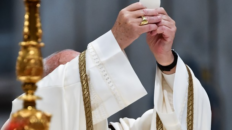When one is out of work, these mysteries help us to filter the pain and stress through the suffering of Christ.
[In his piece on Christian practices in the workplace, David Mills writes of a company that “recently fired a lot of employees on a Monday morning, giving them 15 minutes to clean out their desks before throwing them out of the building. One man had worked at the publisher for 20 years, and was rewarded thusly. This was even worse than it sounds.”
His column brought to mind this Rosary meditation for those who have lost their positions and are enduring the difficult process of finding new employment. – Ed]
Prayer has power. When everything is falling apart, prayer holds. Any one of us can suddenly find ourselves out of work, and looking at the job opportunities with failing hope and a growing sense of powerlessness that can truly affect both ego and spirit. Once again, we find that the Mysteries of the Rosary, in this case the Sorrowful Mysteries, help us to identify with Christ, and join our sufferings to his, that all may be One.
First Mystery:
Jesus in Gethsemane
Prayer:
Lord, I feel stranded and abandoned. Although I am surrounded by well-wishers, there is a sense of isolation. Friends who had pledged support are falling away. No one can know precisely what I am feeling right now; I cannot show them how frightened I am of this uncertain path that lays before me. I know only that it is a path I would not choose for myself. Only you, Christ, understand how I vacillate between trust and heart-gripping fear, between “let this cup pass from me” and “Thy will be done.”
Meditation:
As you pray the decade, ponder Jesus’ desolation and fear. His humanity here eclipses his own divinity; fear is brought to the fore, acknowledged and lived through, before trust and surrender are able to take hold. Although you may be more frightened right now than you have ever been, you can bring this to Christ. He has been this frightened. He is the knowing companion who understands before you say a word.
Second Mystery:
The Scourging
Prayer:
When Pilate ordered your unjust scourging he was the authority figure who had no answers; to him you seemed like the minor, bothersome character in a larger drama of governance, bureaucracy and political expediency. From his perspective, your fate was tied to the zeitgeist. I, too, am perceived to be the minor cog in someone else’s great wheel; my humanity goes unconsidered as I endure a very public humiliation.
Each day brings another reminder that I am not able to meet expenses, or to answer the needs of those around me. I fall into doubt and despair, and these tear into my spirit as the Romans’ terrible instruments tore into your flesh. I feel shredded, anonymous. Those watching my ordeal are silent; they contemplate my circumstance, and imagine themselves in my place, as they simply watch.
Meditation:
The scourging of Christ was public knowledge; the crowd understood that Jesus was undergoing torture. The people who loved him were powerless to change anything for him; they could only be present. Informing others that you have lost your job and applying for assistance through various agencies are painful exposures. These can be moments of exquisite interior agony that feel like bleeding in public.
Knowing your family is also watching, worried and helpless only adds to the sense of hopelessness. Mary had to watch and wait during Jesus’ ordeal, too, suffering for him. In a desperate moment, though neither of them could speak to the other of their grief and pain, each knew they were loved by the other. Though you feel unlovable right now, and there is tension and anxiety, trust that you are loved and being loved, even beyond all barriers.
Third Mystery:
The Crown of Thorns
Prayer:
Jesus, we know that all crowns have metaphorical thorns, but upon your head was placed a crown of mockery, meant to further debase you in the cruel manner of bullies. For me, the mockery is an interior jeering and snarling at myself. As I seek out jobs that do not exist, or will not be offered to me, my ego is taking a beating; my confidence in my abilities is being shaken. All of my skills, all of my knowledge and experience — these aspects of myself by which I have been defined for so long — are being weighed by strangers who find them unremarkable.
The indifference is painful, and in that pain I find my own excesses of pride; I see that I have built my life around what I do, rather than who I am. Now, faced with less doing and more being, I feel like a stranger to myself, a false monarch in a castle built on sand. Help me to recollect that I am more than my curriculum vitae, that I was loved into being. Remembering this, I beg you to help me see what I was born to be, and to pursue my being, in you for whom there are no strangers.
Meditation:
Confidence and pride, ego and attitude all manifest themselves in how we present ourselves to the world, and how we understand ourselves in response to lifelong feedback. A painful stripping off of these protective layers reveals our shared vulnerability. No matter how successful one is in the eyes of the world, or how humble, when stripped of our self-trappings, we are each alike in our need to be loved, protected and valued.
Pope Benedict XVI has written, “If an individual is to accept himself, someone must say to him: ‘It is good that you exist’ — must say it, not with words, but with that act of the entire being that we call love.” Losing a job abruptly, or a prolonged experience of unemployment can make one feel unloved and irrelevant. But it is good that you exist. Others believe this. Christ knows this. You are meant to know it, too.
Fourth Mystery:
Carrying the Cross
Prayer:
Christ, when you carried the wood to which you would be nailed, it was a long walk no one else could make. Beaten, exhausted, hungry and thirsty, you trudged along, each step heavy with fatigue. In the heat and dust, your destination seemed to waver, its location uncertain. Weakened, you must have been tempted to give up and let them kill you where you dropped.
When Simon of Cyrene was called upon to help you, your burden was lessened, but that only allowed the torturous walk to go on; it was a bittersweet assist. I know something of that.
As I find myself depleting reserves I may never be able to rebuild, or having to accept help I would prefer not to need, it is bitter; it feels like a downcasting humiliation. Help me carry my cross as you carried yours, with humble dignity.
Meditation:
Humility is a scorned virtue — a cultivated garden our society disdains. Humility is misunderstood as weakness when, in fact, it is the strong foundation upon which dignity and blessings are built. The Messiah washed the feet of his own disciples; he accepted unjust abuse when he could have unleashed retribution.
His eventual victory began with acquiescence, with a willingness to become the most vulnerable of all creatures, a human infant. Humility embraced with dignity is a perspective-changer; it brings gratitude, without which there is no room for even the smallest of joys to penetrate, and eventually heal.
Fifth Mystery:
Dying on the Cross
Prayer:
To be honest, Jesus, remembering your death does not immediately fill me with hope. You died! Planted amid jeering onlookers and gamblers and weeping women, all of your energy spent, you died. That seems hopeless, but because you always invite me to look more closely, I will look at you, crucified, and here I comprehend that everything I am feeling, all of my experiences in this ordeal, have been nailed with you to the cross.
You too were terrified and anxious; you too were abandoned by your friends. You too were publicly shamed, and left to the mercies of weak authority, indifferent bureaucrats and bullies. You too groaned under the weight of your trouble; you were conscious of familial grief; you were stripped and exposed, and humiliated.
In your crucifixion, you are with me. I join my suffering to yours. Help me to die to my fear, die to my doubt, die to my own narrow demands, so that through you, with you, in you, I may yet arise, again.
Meditation:
Dying to self, to one’s own plans, to a worldly ambition, takes great trust. Trust now. Laying your cross upon the cross of Christ, empty your hands; allow your fearful heart to pour itself out before him. Be emptied that you may receive what Christ has for you. In this sort of death, there is only consummation, and therefore a promise of future glory; “I know the plans I have for you,” says the Lord, “plans of fullness, not of harm, to give you a future, and a hope.”
From Christ’s death on that awful Friday came, finally, the sweetest of Sundays. Time ended with the tearing of the veil, and the rolling back of the stone. The rest is illusion and catching up. There is nothing to be afraid of.






Add comment